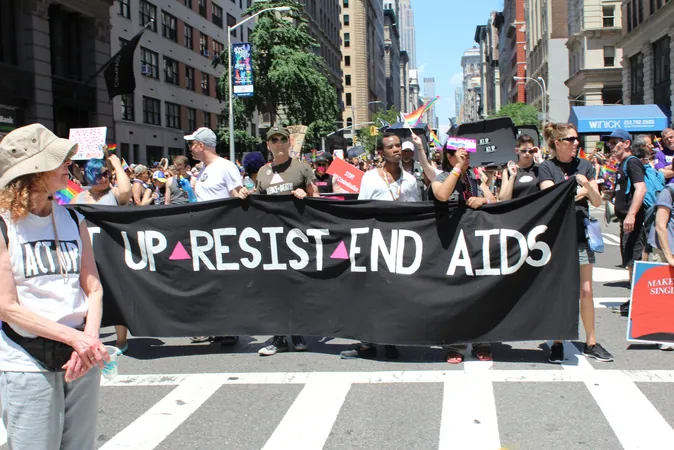
Is HIV on the Brink of a Major Resurgence? Here’s What You Need to Know!
2025-01-22
Author: Ken Lee
The world has witnessed significant strides in HIV science over the past few years. While a definitive vaccine or cure remains elusive, innovative long-acting injectable medications now offer protection against HIV for up to six months with just one dose. This breakthrough has the potential to reshape global strategies in the battle against an epidemic that still claims a life every minute!
However, this progress is perilously threatened by rising populism and backlash against human rights, which could derail decades of advancements in HIV and public health. In the United States, the President’s Emergency Plan for AIDS Relief (PEPFAR)—a bipartisan success story that has saved approximately 26 million lives—faces significant opposition. The potential dismantling of this program could result in millions being cut off from vital treatment and services.
The National Institutes of Health (NIH) finds itself under increasing scrutiny regarding its HIV research funding, with some policymakers calling into question decades of peer-reviewed evidence. Alarmingly, individuals like Robert F. Kennedy Jr., who is being considered for the role of U.S. health secretary, have propagated baseless claims linking vaccines to autism and have disputed the established connection between HIV and AIDS. This trend of undermining science, particularly at the governmental level, poses a grave risk to public health.
Moreover, human rights violations exacerbate the HIV crisis in many regions. For instance, Uganda recently upheld some of the world’s most stringent anti-LGBTQ+ laws, while more than half of the 67 countries that criminalize same-sex relationships are located in sub-Saharan Africa—the region most heavily burdened by HIV. This hostile environment often leads to increased rates of HIV infections. Additionally, punitive drug laws and restrictive policies in countries like Russia have resulted in an alarming surge of HIV cases.
If we don't act now, the consequences of ignoring scientific evidence and infringing on human rights could lead to setbacks not only in the fight against HIV but in future pandemics as well. Recent outbreaks, such as the resurgence of Mpox and concerns surrounding H5N1 bird flu, serve as ominous reminders. HIV could easily follow if we continue down this path.
So, what steps can be taken to reverse this dangerous trajectory and eradicate HIV for good?
1. Champion Human Rights: The protection of human rights should be viewed as a critical public health strategy. Discriminatory policies not only endanger the lives of the most vulnerable but also hinder effective HIV prevention and care.
2. Protect Civil Society Organizations: Successful public health campaigns in HIV have been driven by empowered civil society. These organizations are indispensable, particularly in areas where stigma and discrimination impede access to healthcare. Over 50 countries, however, have enacted laws restricting the funding crucial for many HIV initiatives, directly impacting lives.
3. Depoliticize Health: Despite lessons learned during the COVID-19 pandemic, global efforts to draft a pandemic treaty were thwarted by geopolitical tensions in 2024. This treaty aimed to address health inequities revealed during COVID, and the failure highlights that public health now frequently takes a backseat to politics. Such trends threaten global health equity and must be challenged during future negotiations.
4. Enhance International Cooperation: UNAIDS has warned that funding for HIV initiatives has plummeted to less than half of 2015's resources, neglecting essential health institutions like the World Health Organization. Initiatives such as PEPFAR and the Global Fund have saved millions of lives and must be defended against budget cuts.
In conclusion, achieving progress against HIV requires a united front of science, policy, and civil society working together. The legacy of HIV activism teaches us that inclusive approaches can lead to sustainable change. To avert regression and suffering, we must rally against anti-human rights movements and reaffirm the role of science in societal advancement.
Let's not allow the gains made to evaporate. The stakes could not be higher, and with the right actions, we can overcome this looming crisis and ensure a brighter, healthier future for everyone.




 Brasil (PT)
Brasil (PT)
 Canada (EN)
Canada (EN)
 Chile (ES)
Chile (ES)
 Česko (CS)
Česko (CS)
 대한민국 (KO)
대한민국 (KO)
 España (ES)
España (ES)
 France (FR)
France (FR)
 Hong Kong (EN)
Hong Kong (EN)
 Italia (IT)
Italia (IT)
 日本 (JA)
日本 (JA)
 Magyarország (HU)
Magyarország (HU)
 Norge (NO)
Norge (NO)
 Polska (PL)
Polska (PL)
 Schweiz (DE)
Schweiz (DE)
 Singapore (EN)
Singapore (EN)
 Sverige (SV)
Sverige (SV)
 Suomi (FI)
Suomi (FI)
 Türkiye (TR)
Türkiye (TR)
 الإمارات العربية المتحدة (AR)
الإمارات العربية المتحدة (AR)